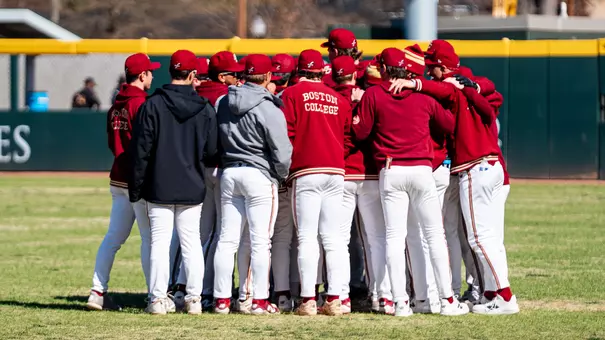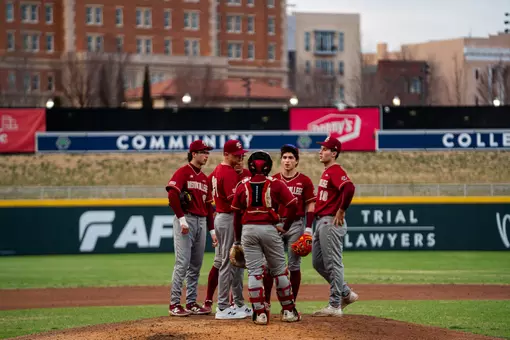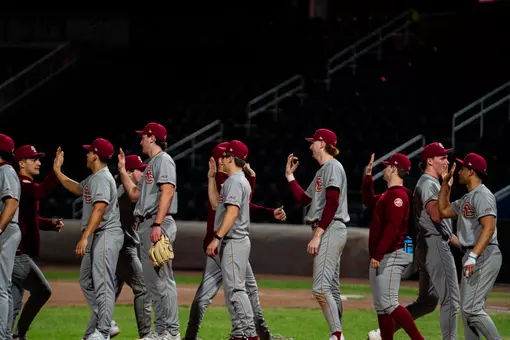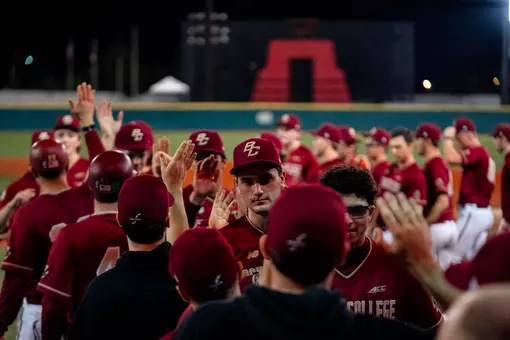Boston College Athletics
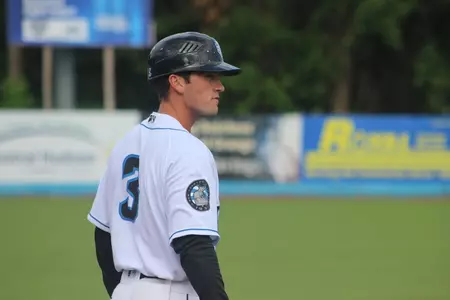
Blake Butera: Head Renegade
October 17, 2018 | Baseball, #ForBoston Files
How a 25-year old first time manager is anything but shocking.
Blake Butera was born to be a baseball guy. His father, Barry, hit .329 for Tulane in the late 1970s and advanced to Triple A to play for the Pawtucket Red Sox, and his brother, also named Barry, lead Boston College to the 2009 NCAA Tournament before being drafted by Houston in that year's MLB Amateur Entry Draft. What he knew about the game prior to his commitment to follow his brother to Chestnut Hill probably dwarfed anyone else his age.
So it's no surprise how he's carved a path right into professional baseball. What might surprise people, however, is that he didn't do it as a player. This past season marked his first year as a manager, having been named the chief of the Hudson Valley Renegades of the Class A Short Season New York-Penn League.
"I was drafted by the Tampa Bay Rays and played two years in their organization," Butera said. "After my second year, they offered me a coaching job straight from playing. I had just played for them in spring training, and a week later, I was a coach. So it was a quick transformation over, and I coached (2017) in Hudson Valley with the infielders and hitters and coaching first. This year, I was supposed to be in the same role, but during spring training, the Rays pulled me into the office and offered me the position to manage in Hudson Valley. Obviously I was very excited and accepted the position, and here we are."
The quickness hastened a seamless transition from player to coach. Butera starred for the Eagles between 2012-2015 and finished his career as the record holder in walks and at-bats. He finished second with 207 games played, 205 starts and 346 times reaching base. He had two hitting streaks finish in the record books when he hit successfully in 13 straight games in 2012 and 12 straight games in 2014, helping him tie for sixth in career hits upon graduation.
"Blake was like a lot of our guys," head coach Mike Gambino said. "He wasn't heavily recruited, but you had to watch him play and you had to get to know him to know how valuable he could be to a team. He's a better player than his tools said he should have been. You could knock some parts of his game, but he was a really, really good player in the field. He could run the bases and play defense. His offensive numbers were great, and he was a leader on the field. Every game, he did something to make a 'baseball play' that someone would say, 'That's how you play the game.' All he wanted to do was watch baseball every night and constantly talk about."
Butera's professional career might have only lasted two seasons, but his advanced hitting metrics proved his baseball IQ. He only hit .255 with Princeton in 2016, for example, but he hit .317 on balls in play with over 35% of his hits for extra bases. He showed a knowledge for displaying the right balance of aggressiveness and balance. It was a database built from his time at BC, and it helped earn him a spot behind the bench.
"Obviously my goal as a player was to make the big leagues," Butera said. "I got everything that I could out of what I had, and I put in as much work as I could. I have no regrets looking back. Once I felt that way, I started to think about my future in the game as something other than a player. It's something I talked to Mike Gambino a lot about as a player. When I was at BC, I thought I was going to play in the majors, but luckily, Gambino helped me in certain situations to pay attention to certain things. I didn't think much of it at the time, but looking back, they were helpful."
"In college baseball, everything comes from the bench," Gambino said. "For immediate success, that helps. But it's not as good for the long term development of the players in the program. It's not that we don't care about winning because we do, but this helps us win long term. I don't believe in baseball instincts because there's nothing instinctual about a person knowing when to go from first to third or when to throw to second instead of home. So I believe baseball instincts are a database that comes from preparing for situations. You let the kids struggle and fall sometimes so they get better. That's why you see our guys get green lights more on the bases than any other program.
"That's how it works in professional baseball," he said. "Guys have to make their own decisions. I want the players to know the game so late in the game, they know when to throw in a particular alignment, and they can call it themselves. If they put in something we don't love, we can switch and talk about it afterwards. "
It's something that helped Butera lead the Renegades to the NYP League Finals this past season. They finished with the best record in the league after going 45-30 and won the McNamara Division by five games. In the playoffs, Hudson Valley ousted Auburn (a Washington Nationals affiliate) before dropping the league championship game to the Tri-Valley ValleyCats, who play under the Houston Astros' flag.
"You want to get off to a good start, which we fortunately did this year," Butera said. "I knew it was going to be tough, and luckily I had some guys who had been around the organization who came in and helped me early in my career. We played games in extended spring training, so the coordinators helped me out, and I had Bill Evers, one of our short-season field coordinators, with me in Hudson Valley to start. I learned a ton this first year, what not to do and what to do - maybe more what not to do but that's something they told me (would happen).
"They told me I'd make mistakes, but they never questioned me," he said. "They would call and ask me why, but they would talk it through to help me. It was awesome to hear that they weren't going to be behind my back talking about me. The organization was there to help."
"When the Rays talked about him for the draft, I told someone that they would hire him after his career ended, whenever that would be," Gambino said. "To do it that fast doesn't happen, but the fact that they made Blake a manager doesn't surprise me. He was universally respected by teammates here, and he has that same kind of respect from everyone who he played with and for in Tampa."
It was the next step on a baseball life journey that included a four-year stop in Chestnut Hill. Minor League Baseball is all about building for the next level, and that's something Butera learned about when he was at Boston College. He arrived at BC with the first part of the core trusted to rebuild the Eagles, and in his sophomore year, the team went 12-40. But the team was a national contender within two years and advanced to the NCAA Tournament in the year after Butera's class graduated, something the Class of 2015 knows it had a part in creating.
"It's a special feeling to know that what Mike Gambino preaches is true," Butera said. "He told us to leave the program better for the next guy. When I came in, we weren't very good. As a senior, we had a good year, and then BC was one game away from the College World Series the next year. It was bittersweet not being there for the run, but it was really cool seeing what the team did, knowing we had a part in it. Guys on the team texted me and told me how (my class) got them there and saying thank you. That meant a lot.
"I have nothing but great memories from playing at BC," he said. "(Shea Field) wasn't a big stadium, but it was a fun place to play. We were an ACC program playing where people tailgated for football games, so being able to win there was even cooler. You can look at other schools and look at what we had. It was special, with the fans on the parking garage. Obviously we're going to miss that, but the new stadium is awesome and I heard scouts call it the best place to play in the Northeast."
So it's no surprise how he's carved a path right into professional baseball. What might surprise people, however, is that he didn't do it as a player. This past season marked his first year as a manager, having been named the chief of the Hudson Valley Renegades of the Class A Short Season New York-Penn League.
"I was drafted by the Tampa Bay Rays and played two years in their organization," Butera said. "After my second year, they offered me a coaching job straight from playing. I had just played for them in spring training, and a week later, I was a coach. So it was a quick transformation over, and I coached (2017) in Hudson Valley with the infielders and hitters and coaching first. This year, I was supposed to be in the same role, but during spring training, the Rays pulled me into the office and offered me the position to manage in Hudson Valley. Obviously I was very excited and accepted the position, and here we are."
The quickness hastened a seamless transition from player to coach. Butera starred for the Eagles between 2012-2015 and finished his career as the record holder in walks and at-bats. He finished second with 207 games played, 205 starts and 346 times reaching base. He had two hitting streaks finish in the record books when he hit successfully in 13 straight games in 2012 and 12 straight games in 2014, helping him tie for sixth in career hits upon graduation.
"Blake was like a lot of our guys," head coach Mike Gambino said. "He wasn't heavily recruited, but you had to watch him play and you had to get to know him to know how valuable he could be to a team. He's a better player than his tools said he should have been. You could knock some parts of his game, but he was a really, really good player in the field. He could run the bases and play defense. His offensive numbers were great, and he was a leader on the field. Every game, he did something to make a 'baseball play' that someone would say, 'That's how you play the game.' All he wanted to do was watch baseball every night and constantly talk about."
Butera's professional career might have only lasted two seasons, but his advanced hitting metrics proved his baseball IQ. He only hit .255 with Princeton in 2016, for example, but he hit .317 on balls in play with over 35% of his hits for extra bases. He showed a knowledge for displaying the right balance of aggressiveness and balance. It was a database built from his time at BC, and it helped earn him a spot behind the bench.
"Obviously my goal as a player was to make the big leagues," Butera said. "I got everything that I could out of what I had, and I put in as much work as I could. I have no regrets looking back. Once I felt that way, I started to think about my future in the game as something other than a player. It's something I talked to Mike Gambino a lot about as a player. When I was at BC, I thought I was going to play in the majors, but luckily, Gambino helped me in certain situations to pay attention to certain things. I didn't think much of it at the time, but looking back, they were helpful."
"In college baseball, everything comes from the bench," Gambino said. "For immediate success, that helps. But it's not as good for the long term development of the players in the program. It's not that we don't care about winning because we do, but this helps us win long term. I don't believe in baseball instincts because there's nothing instinctual about a person knowing when to go from first to third or when to throw to second instead of home. So I believe baseball instincts are a database that comes from preparing for situations. You let the kids struggle and fall sometimes so they get better. That's why you see our guys get green lights more on the bases than any other program.
"That's how it works in professional baseball," he said. "Guys have to make their own decisions. I want the players to know the game so late in the game, they know when to throw in a particular alignment, and they can call it themselves. If they put in something we don't love, we can switch and talk about it afterwards. "
It's something that helped Butera lead the Renegades to the NYP League Finals this past season. They finished with the best record in the league after going 45-30 and won the McNamara Division by five games. In the playoffs, Hudson Valley ousted Auburn (a Washington Nationals affiliate) before dropping the league championship game to the Tri-Valley ValleyCats, who play under the Houston Astros' flag.
"You want to get off to a good start, which we fortunately did this year," Butera said. "I knew it was going to be tough, and luckily I had some guys who had been around the organization who came in and helped me early in my career. We played games in extended spring training, so the coordinators helped me out, and I had Bill Evers, one of our short-season field coordinators, with me in Hudson Valley to start. I learned a ton this first year, what not to do and what to do - maybe more what not to do but that's something they told me (would happen).
"They told me I'd make mistakes, but they never questioned me," he said. "They would call and ask me why, but they would talk it through to help me. It was awesome to hear that they weren't going to be behind my back talking about me. The organization was there to help."
"When the Rays talked about him for the draft, I told someone that they would hire him after his career ended, whenever that would be," Gambino said. "To do it that fast doesn't happen, but the fact that they made Blake a manager doesn't surprise me. He was universally respected by teammates here, and he has that same kind of respect from everyone who he played with and for in Tampa."
It was the next step on a baseball life journey that included a four-year stop in Chestnut Hill. Minor League Baseball is all about building for the next level, and that's something Butera learned about when he was at Boston College. He arrived at BC with the first part of the core trusted to rebuild the Eagles, and in his sophomore year, the team went 12-40. But the team was a national contender within two years and advanced to the NCAA Tournament in the year after Butera's class graduated, something the Class of 2015 knows it had a part in creating.
"It's a special feeling to know that what Mike Gambino preaches is true," Butera said. "He told us to leave the program better for the next guy. When I came in, we weren't very good. As a senior, we had a good year, and then BC was one game away from the College World Series the next year. It was bittersweet not being there for the run, but it was really cool seeing what the team did, knowing we had a part in it. Guys on the team texted me and told me how (my class) got them there and saying thank you. That meant a lot.
"I have nothing but great memories from playing at BC," he said. "(Shea Field) wasn't a big stadium, but it was a fun place to play. We were an ACC program playing where people tailgated for football games, so being able to win there was even cooler. You can look at other schools and look at what we had. It was special, with the fans on the parking garage. Obviously we're going to miss that, but the new stadium is awesome and I heard scouts call it the best place to play in the Northeast."
Men's Basketball Recap: 68-67 Win vs Wake Forest
Thursday, February 26
Men's Basketball: Wake Forest Postgame Press Conference (Feb. 25, 2026)
Thursday, February 26
The Podcast for Boston Women's Tennis Edition
Tuesday, February 24
The Vision: 2026 Winter Workouts with Boston College Football
Tuesday, February 24

